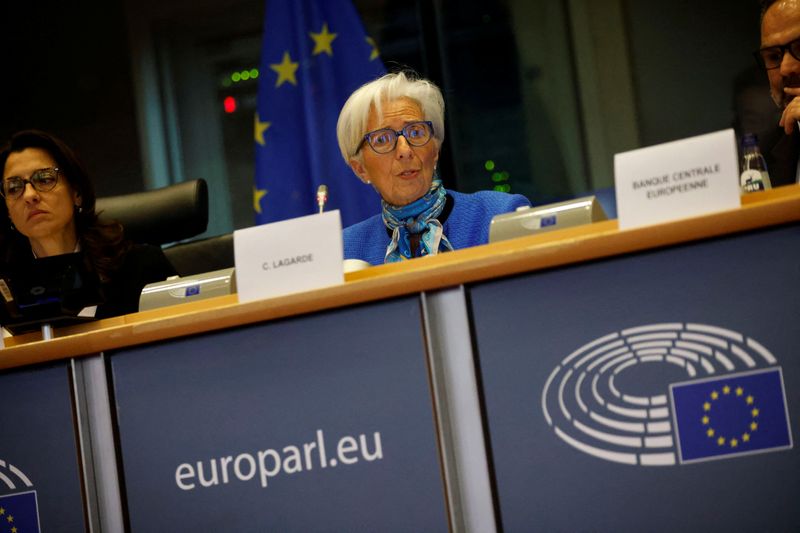By Francesco Canepa and Balazs Koranyi
FRANKFURT (Reuters) -Financial market turmoil may do some of the European Central Bank's work for it if it dampens demand and inflation, ECB President Christine Lagarde said on Monday.
With investors and bankers worrying about the risk of a banking crisis, Lagarde reaffirmed that market turbulence won't stand in the way of the ECB's fight against inflation - but it might actually help it.
This was a likely reference to the fact that both higher central bank rates and jitters in the banking sector tend to have the same effect by discouraging lending and cooling economic activity.
"Clearly financial stability tensions might have an impact on demand and might actually do part of the work that would otherwise be done by monetary policy and interest rate hikes," Lagarde told European lawmakers.
The ECB raised the interest rate it pays on bank deposits by 50 basis points on Thursday to 3% and Lagarde reaffirmed on Monday that the inflation outlook alone would warrant more rate hikes.
But she made no commitment, likely concerned that market turmoil could fundamentally change the outlook.
Investors have scaled down their bets on how far the ECB will push the deposit rate this year to 3.1% from more than 4% only two weeks ago.
Some critics said the ECB will be forced to make a choice between fighting inflation and preserving financial stability -- an argument Lagarde firmly rejected in a hearing at the European Parliament's Committee on Economic and Monetary Affairs.
For inflation, Lagarde said interest rates will remain the ECB's main tool while for the bank sector, the ECB can utilise its existing lending facilities or devise new ones, Lagarde said.
Financial stocks tumbled last week on fears of a new banking crisis, but they rose on Monday after UBS Group's state-backed takeover of Credit Suisse appeared to close off one source of worry for the global banking sector.
Lagarde said euro zone banks were resilient and their exposure to Credit Suisse was in the millions of euros rather than the billions.

But she repeated a warning that they should prepare for slower economic growth, higher funding costs and lower lending volumes.
"Individual financial institutions should carefully preserve their current levels of resilience, to ensure that they could weather a potentially less favourable environment," Lagarde said.